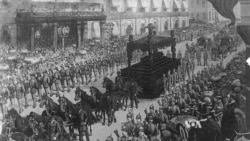It’s hard to imagine that death was once an intimate part of American life.
That was the case during the Civil War, this nation’s bloodiest, which killed more than 600,000 people. Grainy, black-and-white photos of 1860s battlefields littered with corpses give a glimpse of the scale of death. Proportionately, it would be like losing 7 million, or 2.5 percent, of the country’s current 319 million residents.
"Almost everyone lost a loved one or knew someone who lost a loved one," historian and Harvard University President Drew Gilpin Faust said last year at a commemoration of the 1863 Battle of Gettysburg. "People saw death with an intensity and a scale that had been unimaginable previously."
But in modern America, death is a topic to be avoided.
"Many of us have bought into the ‘truth’ that a conversation about death is about as impolite as sexual dysfunction," said Theresa Gale of the Kittamaqundi Community Church in Columbia, Maryland, which recently hosted a "Discussion on Death."
It’s a simple idea: A group of people get together in a coffee shop, a restaurant, a church, or even a cemetery, and talk about death and dying. The hope is that talking about these taboo topics will make the final moment less terrifying to face.
The so-called "death café" movement started several years ago in London by Jon Underwood, who was inspired by the writings of Swiss sociologist Bernard Crettaz.
Since then, more than 1,100 cafes have been held, mainly in Europe and Anglophone countries, according to Underwood’s Death Café website. He’s planning to open a permanent “Death Café” in the British capital.
Goal of easing fears
At the Kittamaqundi church, in a suburb between Baltimore and Washington, the gathering was called a "Discussion on Death." The participants, sitting in a circle and sampling tea and cake, talked about why they came.
"I’d like to have control over my own death," said one woman.
"I would like to be more accepting of however, whatever happens," said another.
Then they passed the microphone to Ruth Anne "Pinkie" Celtnicks.
"I would like some pointers as to how I can go out saying, ‘Bye-bye!' " she said, laughing.
Celtnicks’ smiling optimism was surprising, given that she was recently diagnosed with terminal cancer.
"You start dying from the moment you are born," she said in an interview afterward. "I’m 72 year’s old. Good lord, how long do I need" to go on living?
Most of the discussion centered around the feeling that much of what people do in life falls far short of preparing them for death.
"Death is the one thing promised to us," said Pat Cochran Engelbach, the meeting's organizer and author of "Last Rights: Taking Care of Your Final Journey."
"I think that for this culture, especially, we have so many distancers between ourselves and death," Engelbach said. "We’re too successful, we’re too good-looking, we have too many toys. These are all distancers between ourselves and the earth."
Funeral industry blamed
She blames in part the funeral industry, which emerged to help Americans deal with the carnage of the Civil War. Embalming, mainly practiced by doctors until then, made it possible for thousands of the corpses to be preserved so they could be sent back to their families.
Caleb Wilde, a sixth-generation funeral director in Pennsylvania, says his profession helped remove death from the home.
"I think the funeral industry has been responsible for the American death denial," he said. "We have taken the responsibilities away from the community, from families, and we’ve been paid to be the shield from the reality of death."
Wilde has attracted national attention by doing something rather unusual in his trade: writing a blog. Many of his posts have been self-critical, but he also believes that Americans need to take more responsibility over their own demise.
"Here in America, we like to think that we’re immortal. We stand on top of the pinnacle of the world and we’ve pursued … wealth or status and we like to think that we will continue to live on indefinitely," he said.
"We all die and we haven’t given much thought to that."





